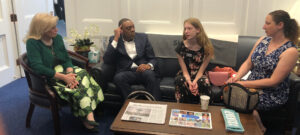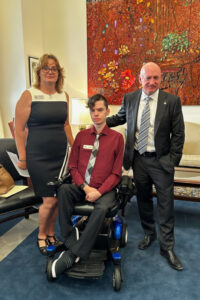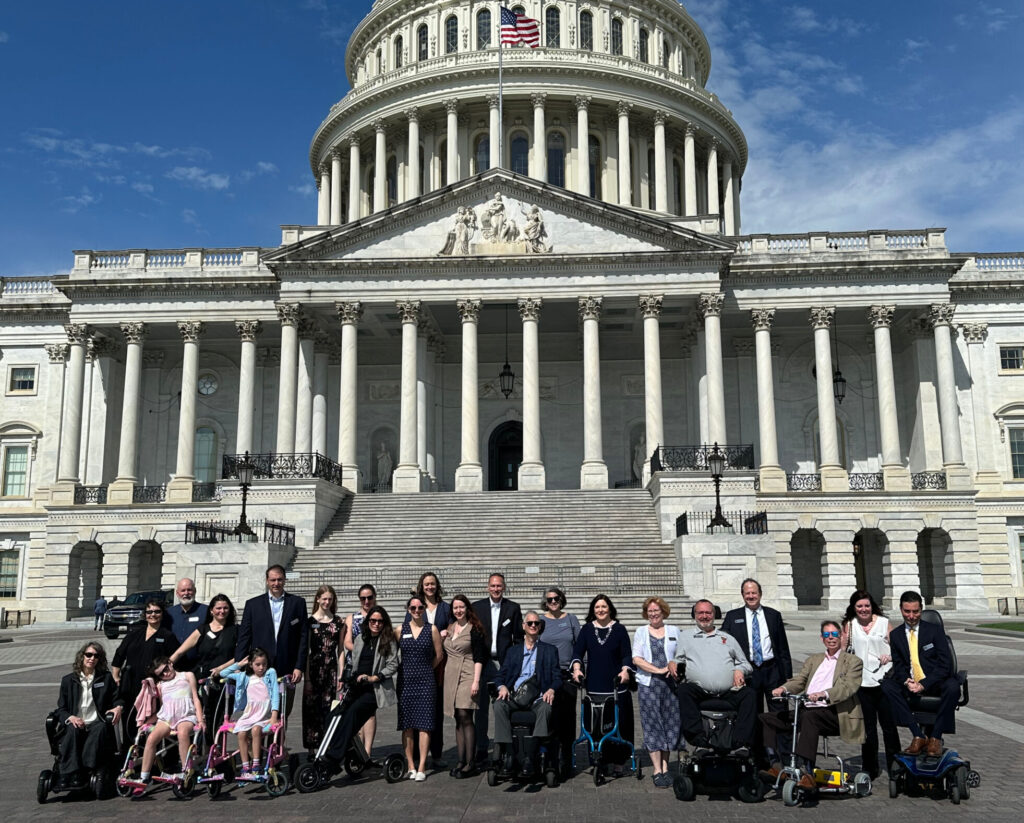A Day of Impact in Washington, D.C.
On May 8th, the FSHD Society held its first-ever Day on Capitol Hill in Washington, D.C. This milestone in our advocacy efforts brought together over a dozen individuals living with FSHD and their families from across the country to have their voices heard by legislators. Throughout the day, advocates engaged in 15 meetings with lawmakers and their staff, aiming to secure support and raise awareness about FSHD.
A “Hill Day” is an opportunity for advocacy and nonprofit groups to meet with lawmakers and share their concerns. For us, this event was about building relationships, sharing our stories, and advocating for essential change. One participant, Chris Carrino, founder of the Chris Carrino Foundation, shared his thoughts afterward: “Ever since I put my name on a foundation, I always saw myself on Capitol Hill lobbying Congress for an FSHD treatment…It’s hard to quantify the results of our meetings, but I do know this: if we don’t try, we won’t get anywhere. In the meetings, our goal was to humanize FSHD and express the urgency for a treatment.”

The day was a whirlwind of activity, with patients, parents, and spouses attending consecutive meetings to share their stories and demand focus on FSHD. By breaking into small groups, we were able to cover more ground, each group speaking with the offices of three to five different senators and representatives. Through their diverse experiences, the patient advocates painted a comprehensive portrait of FSHD's effects for everyone they met with.
Vera Treonze, who lives with FSHD along with her daughters Isla and Siena, spoke about the impact of Early-Onset FSHD. Reflecting on the day, Vera said, “It is the first step in the legislative trajectory to ensure a cure is accessible for all affected, including children! It was an honor to be involved with so many other brave and strong advocates that have united to bring awareness to our community.”
On a typical Hill Day, advocates often meet with staff members of representatives who are too busy to meet face-to-face, but a few groups were fortunate enough to speak directly with Representatives Debbie Dingell, Robert Menendez Jr., and Doris Matsui, and Senators Mark Kelly and Roger Wicker. In addition to providing education about FSHD, we requested that lawmakers sign on to our resolution recognizing June 20th as World FSHD Day. We also asked for support for the FAA’s reauthorization bill to ensure more accessible air travel—a landmark bill championed by the Muscular Dystrophy Association, which was passed a week later. In each meeting, we highlighted the need for funding streams directed toward patient access, upper body mobility awareness, and FSHD research.

Most of the legislators and staff were previously unaware of FSHD, but now they not only know about it, but they have heard memorable stories from patients and can put faces to this disease. Laura Maffei, a patient advocate from New York, commented, “It was a rewarding and meaningful day. Taking any action always feels good, and this action laid a foundation with legislators. It was an important step in FSHD advocacy.”
We are incredibly thankful for the advocates who came to D.C. for committing their time and energy and for their willingness to share their stories. We are also grateful to KPM Group, who worked with Anna Gilmore, Director of Patient Engagement at the FSHD Society, to plan the day. KPM Group, with the support of Fulcrum Therapeutics, provided invaluable expertise and guidance throughout the planning process, holding a training session and attending meetings with us on May 8th.
Our primary goal for this Hill Day was to bring attention to the unique challenges faced by people living with FSHD and to advocate for awareness and policies that will significantly improve lives. By meeting directly with legislators, we aimed to convey the urgency of our needs and the profound impact that supportive policies could have. Policymakers in Washington can influence research funding, regulatory decisions, and insurance coverage, and with the first treatments for FSHD on the horizon, we must work now to ensure that everyone affected will be able to access these therapies.
The FSHD Society is entering a new era in its advocacy work. This August, we will speak to the FDA about upper-body mobility, emphasizing the significant impact of shoulder and arm weakness on quality of life and daily activities. With this session, we hope to ensure that this aspect of FSHD is recognized as a benchmark of disease progression, improving the review and regulation of future therapies. There is much work to be done, but we’ve seen time and again that our community is up to the challenge.



Leave a Reply